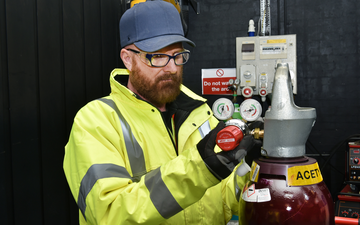- Official BOC UK Online | Industrial Gases | Products & Solutions | BOConline UK
-
Shop
- Industries
- Processes
- Gases & Equipment
-
Solutions
-
Services
-
Health & Safety
-
Contact & Support
- What's Happening
-
Net Zero Strategies
Safety First: Is it Time for your Gas Equipment Check?
Posted by BOC

Why your gas equipment should be added to your list of annual safety checks.
How many safety checks do you undertake each year?
Your fire extinguishers? Maybe your boiler? How about the gas equipment in your workshop?
If you own a business that uses gas equipment, it’s your legal responsibility to ensure that it is in a safe condition, well maintained and inspected regularly where required.
But what do we mean by safe? And what does a safety check involve? Here’s everything you need to know.
What are the legal requirements?
The Health and Safety at Work Act 1974 states that an employer or self-employed person has a responsibility to provide and maintain plant and systems of work that are, so far as reasonably practical, safe and without risk to health.
The British Compressed Gases Association (BCGA) Code of Practice provides guidance on maintenance of your gas equipment and recommends that regulators and flashback arrestors, for example, are checked annually by a competent person.
It is your legal obligation to ensure that gas equipment used in the workplace is in a safe condition and well maintained, and a gas equipment safety check is one of the easiest and most cost-effective ways to do so.
What does a gas equipment safety check involve?
There are two types of safety check – CP7, and CP47. A CP7 check applies if you are using oxy fuel gases, and a CP47 check applies if you are using single cylinder gas.
An inspector will visit your site and undertake a visual and functional check of your regulators, your flashback arrestors, your hoses and blowpipes. They’ll be making sure they all work correctly, they are in date and comply with industry standards, and that there are no defects that could lead to any problems, such as leaks or damage.
Book your CP7 / CP47 Inspection nowWhat happens if my equipment passes?
If your equipment passes the inspection, you’ll receive a Report of Thorough Examination, which provides written evidence that you are proactively following the Health and Safety Executive’s requirements – as well as a certificate.
What happens if my equipment fails?
The Report of Thorough Examination is a little like an MOT report and will flag any areas in which your equipment has failed. If a BOC inspector is undertaking your inspection, they’ll replace any parts on the spot, so you can be sure your equipment is safe and ready to use after they leave.
Are there any other benefits?
Not only can a gas equipment safety check protect your business, it can also help with your insurance to demonstrate that you are taking proactive steps to comply with workplace regulations.
A CP7 or CP47 inspection is also very cost-effective and easy to book – a small price to pay for peace of mind.
Are you ready to book your CP7 or CP47 inspection?
BOC’s inspectors are located throughout the UK. They undertake the most in-depth training in the industry and while they’re on your site checking your gas equipment, they can also help with any other questions you have around using, storing and transporting cylinders.
If you would like more detail on CP7 and CP47 inspections, or to book your inspection, visit our Gas Equipment Safety Inspections information page.
Book your CP7/CP47 inspection